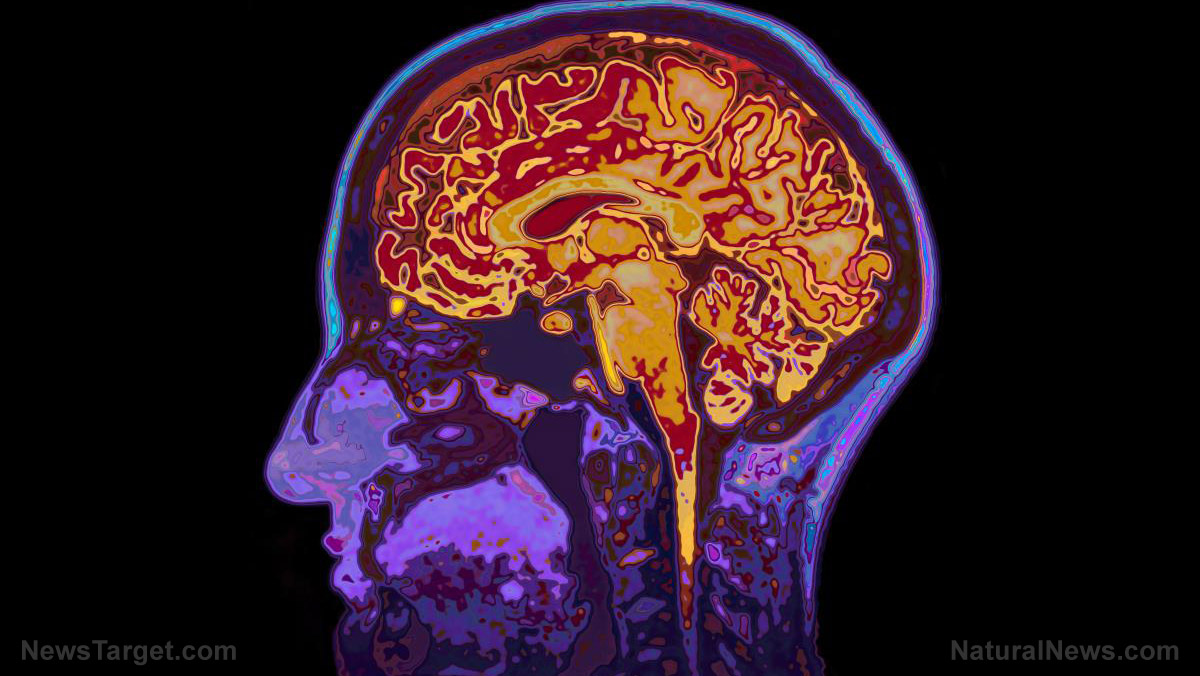Nature Knows and Psionic Success
God provides
Are you taking these prescription drugs that cause memory loss?

( Natural News ) Get your pens out, ladies and gents — we’re describing the three most common prescription drugs that increase the likelihood of memory loss. Memory loss, which is often interpreted as one of the early signs of Alzheimer’s, can actually be a side effect of standard prescription drugs . Worse, most people remain unaware of these risks and assume that their inconceivable forgetfulness is a symptom of ageing. Dr. Armon Neel, a geriatric pharmacist with the AARP, disagrees, “scientists now know that memory loss as you get older is by no means inevitable [emphasis added]. Indeed, the brain can grow new brain cells and reshape their connections throughout life.” So if you find yourself suddenly forgetting things you normally wouldn’t, one of these prescribed drugs may be the culprit . Anticholinergics Otherwise known as the “anti” drugs, these include medicines like antihistamines, antipsychotics, antibiotics, and antihypertensives. These “anti” drugs affect the levels of acetylcholine, a primary neurotransmitter associated with memory and learning. Neurologists have found that people with low levels of acetylcholine have difficulties concentrating or finding the correct word. In fact, deficiencies in this neurotransmitter are often linked to dementia and Alzheimer’s and the medications for these disorders “work” by preventing the breakdown of acetylcholine in the brain. What your doctor won’t tell you though is that the side effects of anticholinergic drugs are more severe among seniors. This is due to the natural reduction of the neurotransmitter as we age. Seniors who take anticholinergic drugs increase their risk of developing dementia by around 30 percent , according to conservative estimates. Get CLEAN FOOD and help support our mission to keep you informed : The Health Ranger Store lab verifies everything we sell with accredited testing for heavy metals, microbiology and food safety. Certified organic […]
Food for thought: Brown rice reduces cognitive dysfunction linked to Alzheimer’s
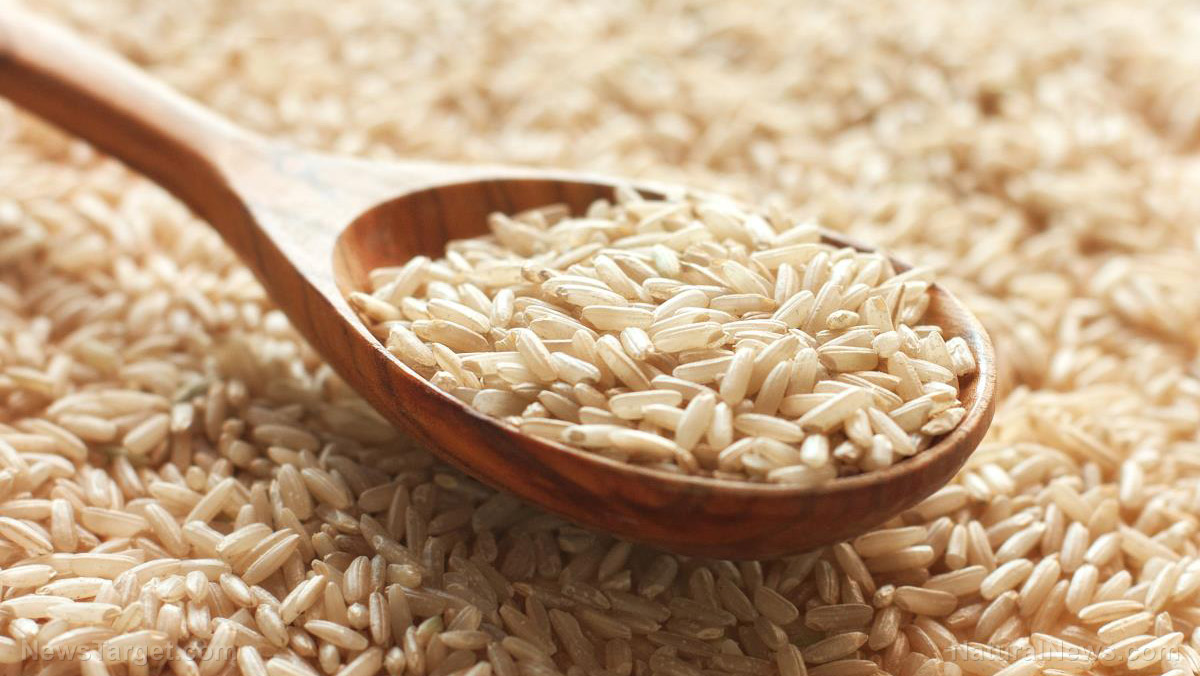
( Natural News ) Researchers in Japan have found that Oryza sativa (commonly known as brown rice) can prevent the development of dementia. In the study, published in the BMC Complementary and Alternative Medicine , researchers used a high-pressure technique in order to increase the digestibility and absorption of O. sativa . Although O. sativa contains nutrients and protective components against the development of dementia, the body cannot properly absorb these because O. sativa is difficult to digest. Because of this, researchers at Doshisha University , Shimane University , and Shimane Institute for Industrial Technology in Japan aimed to improve digestibility and absorption of brown rice without affecting its nutrient composition using a high-pressure technique. For the study, they pressurized brown rice at 600 megapascal (Mpa) to produce the highly-pressurized brown rice. After that, they fed it to an Alzheimer’s disease mouse model, senescence-accelerated mouse prone 8 (SAMP8), to look at the effects of the treatment on dementia prevention. They assessed the working memory of the mice using the Y-maze test at the beginning of the treatment and then once every month. The mice were allowed to move freely in the maze for eight minutes. Compared to the wheat-fed control mice, the mice fed with highly pressurized O. sativa exhibited a higher rate of spontaneous alternation in the Y-maze test. The amount of amyloid beta was also lesser in the mice fed with highly pressurized brown rice. Amyloid beta production is the primary cause of Alzheimer’s disease. These results indicated that the highly-pressurized O. sativa improved the cognitive dysfunction of SAMP8 mice through the reduction of the amount of amyloid beta. The treatment group also exhibited better motor functions than the control and polished rice-fed mice, contributing to the prevention of dementia. In conclusion, the improved cognitive function and […]
All-Natural Ways To Get Rid Of Brain Fog

Although brain fog primarily occurs in adults, in children it can cause distractibility, inattentiveness, and lack of focus. Because of these symptoms, the condition is often mistaken for Attention Deficit Hyperactivity Disorder (ADHD). Do you feel like you are not yourself anymore? Is concentrating at work becoming a hard task for you? Are your children constantly reminding you that you have forgotten something for the house when you shouldn’t have? If all these sound familiar to you, there’s a good chance you’re experiencing what is popularly known as brain fog. Brain fog may be the beginning of various health conditions that you can control if diagnosed early. But it isn’t a medical condition, which means that the only line of defense against it is to do what is right for your body – leading a healthy lifestyle. So, if you are muddled in the head and don’t know exactly what you need to do to get rid of your brain fog, here are a few tips we’ve rounded up for you. Include Brain Fog-Busting Herbs, Seeds, And Protein Foods In Your Diet What is good for the body is also good for your brain. So besides eating clean, here are a few things that would be of help. 1. Ashwagandha This herb was traditionally used as a nervine to ease anxiety and stress. It does this by increasing the levels of GABA (gamma-aminobutyric acid) in the body which is a calming neurotransmitter. This compound also improves energy levels and mitochondrial health. By relieving anxiety and calming your nerves the herb might help you focus on your tasks better. 1 How to use: Add 1 tablespoon of powdered ashwagandha root into your everyday smoothie. 2. Chia Seeds This superfood derives its name from the word “strength” in the Mayan language. […]
6 nootropics that make your brain limitless
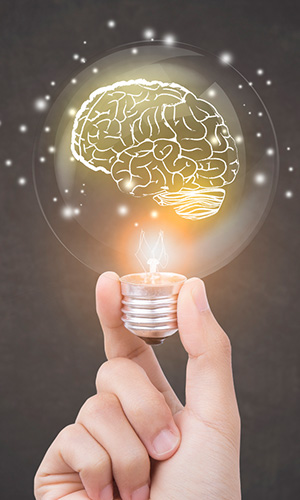
Do you remember the movie “Limitless”? You know, the one where Bradley Cooper played a down-on-his-luck writer who started taking an experimental drug that allowed him to use 100 percent of his brain. He wrote brilliant books in days. Learned new languages. Made a killing in the stock market. Unfortunately, it didn’t end well for Bradley Cooper’s character in the movie, because he took a dangerous and addictive drug that ended up having serious side effects. But what if you could boost your brain power in a less dramatic and dangerous way? That would be pretty cool, right? You can. And a lot of people are already doing it. They’re using nootropics … also known as “smart drugs.” These are natural and synthetic substances people take to improve their cognitive abilities. Now, people who take nootropics can get extreme. Sometimes they take synthetic drugs, which might not be your cup of tea. Or they take a ton of natural substances simultaneously or in high doses, which can get dangerous too. But it’s completely possible to join the nootropics craze in a moderate way. You can try safe and effective natural substances that make you happier, sharper, more alert and help you live your best life. Here are a few proven nootropics that could boost your brain power and make you feel limitless (or close to it): This bestseller , The Uncensored Survivalist , is more than a book… it’s a survival manual! From financial matters to daily living — ALL the information you need to survive the coming hyperinflation crisis is packed into this book. Order this MUST READ today — for 75% off the cover price — and guarantee you have unlimited access to the food, medical care, medicines and supplies you need to live comfortably, NO MATTER […]
Why you really should sleep on it: Resting encourages innovation, creativity

( Natural News ) According to scientific research, there’s a link between sleep and creativity . It may seem counterproductive to nap while you’re trying to brainstorm for a project, but you have a higher chance of experiencing a “Eureka!” moment after you rest or sleep. On sleep and creativity People have their way of understanding certain things, and it can also be difficult to determine precisely when inspiration will strike. However, one thing is sure: People usually feel inspired after they get some rest and sleep. This is especially true when you’re trying to resolve a problem. You now have a scientific reason to let your ideas “incubate,” like what author Steven Johnson advised in a recent presentation. In particular, certain factors can help you “improve your trajectory toward arriving at a moment of creative insight, understanding, or breakthrough.” Dr. Anne Cleary, a professor at Colorado State University who teaches a course called Science of Learning , talked about these factors, which include: Spreading out your attempts to reflect on a problem Taking a break if you feel “stuck” Resting or sleeping in between attempts Earlier studies have already proven that sleep can boost learning and memory. Students would benefit most from this: Taking nap breaks while studying is an effective strategy for enhancing learning. Sleep boosts learning and memory because the memory consolidation processes that go on in the brain start when you’re asleep. Memories are “solidified and strengthened” when you’re asleep, mostly in the phase called “ Slow Wave Sleep ” (SWS). SWS could be one reason why spacing out your study sessions throughout a week is more effective instead of cramming the day before an exam. Sponsored solution from CWC Labs: This heavy metals test kit allows you to test almost anything for 20+ heavy […]
Keep your arteries ecstatic by eating these 12 foods every day

( Natural News ) As common as heart disease is, there are many ways to prevent it — and perhaps the best (and most delicious) place to start is by cleaning up your diet. Supercharging your diet with fiber-rich food filled with healthy fats will allow you to eat your way to a healthy heart and clear arteries. Don’t know where to start? Here are 12 food items you should add to your heart-friendly grocery list, according to TheHeartySoul.com : Fresh Fruit — This one is a no-brainer: Filled with fiber, vitamins, and antioxidants, you’ll be helping your heart, and giving the rest of your body a boost, too. Black beans — Another fiber-rich food, this one also has potassium and other vitamins that promote cardiovascular wellness. Mackerel — This fatty fish is a great source of omega-3, which can lower blood pressure and keep blood vessels elastic. At the same time, it also contains vitamin D, which also lowers blood pressure. Spinach — This is another green vegetable that packs a powerful punch. For the heart in particular, it contains nitrite, which, according to an article on DailyMail.co.uk , helps widen clogged arteries. Avocado — The heart-healthy properties of avocados are no secret. Rich in monosaturated fats as well as potassium, it helps lower cholesterol and regulate blood pressure. Nuts — Another food item that is full of monosaturated fats, they’re also filled with protein, fiber, and antioxidants that make them the perfect heart-friendly snack. Flaxseed — A famous superfood, flaxseed is rich in both omega-3 and fiber, and also contains certain plant compounds that serve as antioxidants. Green Tea — This helps lower cholesterol levels and is known to widen arteries, reducing the risk of blood clots. Sunflower seeds — It contains vitamin E and folate, which […]
‘Skinny fat’ in older adults may predict dementia, Alzheimer’s risk
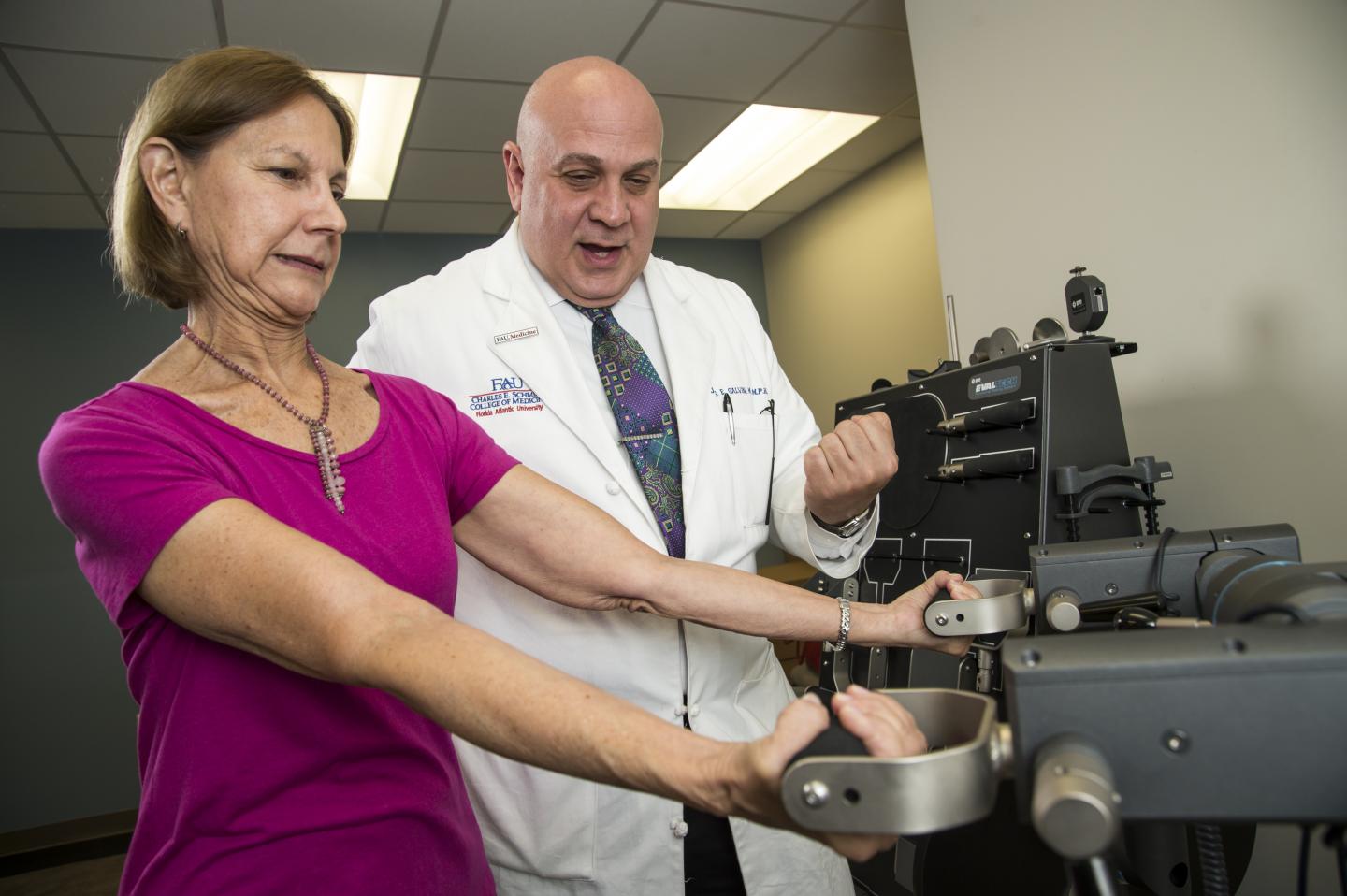
IMAGE: James E. Galvin, M.D., M.P.H., tests a patient’s muscle strength in FAU’s Comprehensive Center for Brain Health. view more A new study has found that "skinny fat" – the combination of low muscle mass and strength in the context of high fat mass – may be an important predictor of cognitive performance in older adults. While sarcopenia, the loss of muscle tissue that is part of the natural aging process, as well as obesity both negatively impact overall health and cognitive function, their coexistence poses an even higher threat, surpassing their individual effects. The study, published in the journal Clinical Interventions in Aging , was led by researchers at Florida Atlantic University’s Comprehensive Center for Brain Health in the Charles E. Schmidt College of Medicine. Using data from a series of community-based aging and memory studies of 353 participants, the researchers assessed the relationship of sarcopenic obesity or skinny fat with performance on various cognition tests. The average age of the participants was 69. Data included a clinic visit, valid cognitive testing such as the Montreal Cognitive Assessment and animal naming; functional testing such as grip strength and chair stands; and body composition (muscle mass, body mass index, percent of body fat) measurements. Results from the study show that sarcopenic obesity or "skinny fat" was associated with the lowest performance on global cognition, followed by sarcopenia alone and then obesity alone. Obesity and sarcopenia were associated with lower executive function such as working memory, mental flexibility, self-control and orientation when assessed independently and even more so when they occurred together. Using a cross-sectional design, the researchers found consistent evidence to link sarcopenic obesity to poor global cognitive performance in the study subjects. This effect is best captured by its sarcopenic component with obesity likely having an additive effect. […]
10 Science-backed benefits of cannabis

( Natural News ) Cannabis may still be prohibited by the U.S. federal government, but that doesn’t mean the prized plant isn’t a medicine. While federal prohibition may make scientific research on cannabis harder to complete, many studies have shown that the plant has wide-reaching medicinal benefits. Research continues to show that for dozens of conditions, cannabis could be a natural solution. As of 2018, 29 U.S. states have legalized cannabis for medical use. In the U.S., legalized medical cannabis is gaining more support than ever, with an 84-percent approval rating according to recent survey data . Even the National Institutes of Health recognizes the medical benefits of cannabis – and it’s a federal organization. All this has left many people wondering why cannabis prohibition is still running strong in the U.S. But despite prohibition’s dampening effect on research, the science on medicinal cannabis continues to pour in. Here are 10 health conditions scientifically shown to have success with cannabis treatment: 1. Cannabis can relieve many types of pain For chronic pain sufferers of any kind, cannabis can bring relief with fewer side effects and less risk than many mainstream treatments. Studies of patients with peripheral neuropathy have shown that pain reduction can be observed within a week of regular use. CBD, or cannabidiol, is thought to be the key pain alleviator here; reports say that it “reduces the inflammatory response and binds to TRPV1 receptors, which are capable of mediating antihyperalgesic effects.” Support our mission to keep you informed : Discover the extraordinary benefits of turmeric gummy bears and organic "turmeric gold" liquid extract , both laboratory tested for heavy metals, microbiology and safety. Naturally high in potent curcuminoids. Delicious formulations. All purchases support this website (as well as your good health). See availability here. Chronic pain can […]
Encouraging the growth and health of nerve tissue may improve memory for those with cognitive decline

( Natural News ) Encouraging the growth of healthy nerve tissue and improving brain neurotrophic factor signaling may enhance memory for people with signs of cognitive decline, according to researchers from the University of Eastern Finland . This could be particularly useful for people who are at risk of neurodegenerative conditions such as Alzheimer’s disease – which is the most prevalent case of dementia. In particular, Alzheimer’s disease is distinguished by the accumulation of the amyloid beta peptide in the brain. Previous research revealed that decreased levels of brain-derived neurotrophic factor (BDNF) were associated with Alzheimer’s disease and cognitive decline in humans. BDNF is the most important neurotrophic factor affecting synaptic function. Impaired synaptic function and synapse loss have also been shown in Alzheimer’s disease, and synapse loss has been reported to correspond with the severity of memory impairment. Thus, the researchers investigated how changes in BDNF signaling impact memory functions and brain pathology. In conducting the study, they used transgenic APP/PS1 mouse models of Alzheimer’s disease with altered BDNF signaling. The results of the study revealed that the reduced BDNF signaling caused memory impairment. Moreover, when BDNF signaling was enhanced, memory impairment was lessened. The researchers also looked at the potential of cerebral dopamine neurotrophic factor (CDNF) in treating Alzheimer’s disease. Previous studies showed that CDNF exhibited strong neuroprotective as well as restorative properties in animal models of Parkinson’s disease and spinal and peripheral nerve impairments. However, its therapeutic effect has not been previously studied in Alzheimer’s disease. Thus, the researchers of the current study infused CDNF as a pure protein or in a viral vector directly into brain hippocampus. This treatment enhanced long-term memory performance of APP/PS1 and wild-type mice. Sponsored solution from CWC Labs: This heavy metals test kit allows you to test almost anything for […]
Why pecans should be your go-to snack when you’re hungry
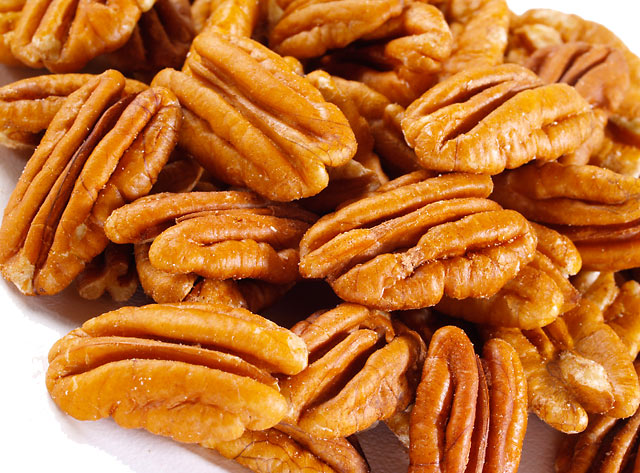
( Natural News ) Contrary to what most people believe, finding a snack that sates your hunger while being good for your body isn’t hard at all. Take the pecan , for example. Pecans are used in a wide variety of food products, most notable of which is pecan pie, a Thanksgiving favorite. But if you are concerned about the sugar, salt, and additives that go in to most pecan dishes, you can always try eating these delicious nuts by themselves. Here are some of the health benefits you’re bound to gain from snacking on pecans: A bunch of antioxidants Nuts like almonds and walnuts are known for their massive antioxidant content, but nothing beats pecans. In fact, studies indicate that pecans have the most antioxidants among nuts. That’s more than 19 vitamins and minerals, including vitamins A (carotenes), B (folate and thiamine), and E, as well as minerals like calcium, potassium, magnesium, phosphorus, and zinc, among others, packed inside a small tasty package. Enhanced immunity Eating pecans can boost your immune system and protect you from common illnesses. Zinc , for example, is crucial to the development and proper function of your immune cells. It can also lower your risk of developing lifestyle- and age-related conditions. The antioxidants in pecans fight free radicals that cause oxidative stress, a key factor in the onset and progression of serious conditions like cardiovascular disease and cancer. More flavonoids Flavonoids are present in pecans, and they can help you avoid many chronic conditions, including diabetes and cognitive decline. Studies indicate a possible connection between weight maintenance and flavonoids, so snacking on pecans may help you achieve your weight loss targets. Sponsored solution from CWC Labs: This heavy metals test kit allows you to test almost anything for 20+ heavy metals and nutritive […]
Iodine deficiency is on the rise in industrialized countries
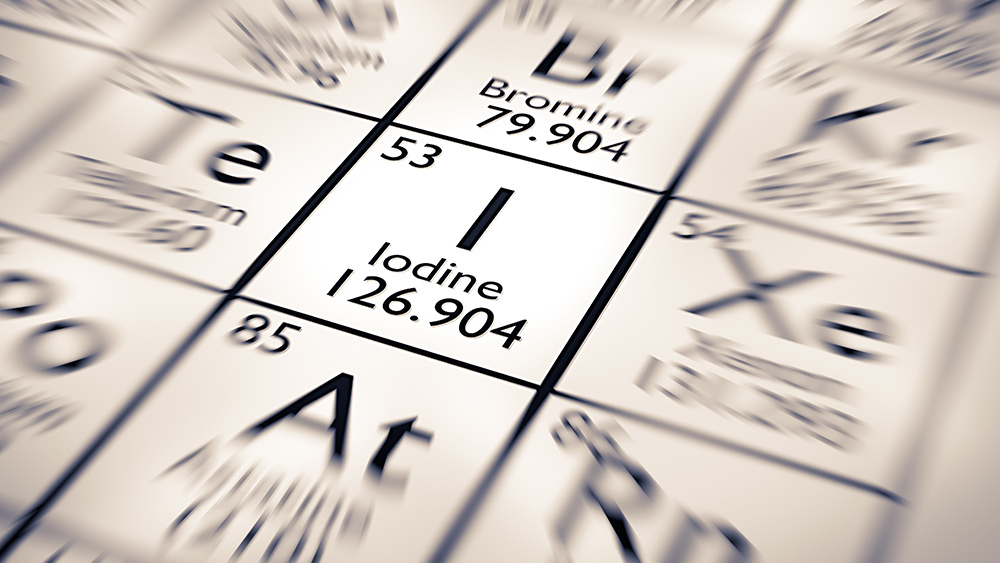
( Natural News ) A lot has been done to curb iodine deficiency in many areas worldwide, but a recent study showed that cases of low maternal iodine levels have been identified in areas that were previously known to be iodine-sufficient. The findings of the study, published in the journal Nutrients , raised some concern on the so-called “re-emergence” of iodine deficiency, especially in industrialized countries. This also puts the spotlight on its possible impacts on public health, as well as the need for supplementation programs. Researchers from the University of Surrey in the U.K. and the Hospital Riotinto in Spain observed the effects of maternal iodine deficiency in different stages of child development – during pregnancy, lactation, and the first two years of life. They observed that iodine deficiency could lead to cognitive consequences such as impaired speech development, learning, and reading skills. The negative cognitive outcomes caused by iodine deficiency also led to an increase in behavioral disorders. This was associated with abnormal serum thyroid concentrations during the early stages of pregnancy. “Iodine is most critical in the early stages of development, as the fetal brain is extremely dependent on iodine supply and cannot be replaced by any other nutrient,” explained study co-author Dr. Ines Velasco of the Pediatrics, Obstetrics and Gynecology Unit of Hospital Riotinto . “So an adequate iodine intake in pregnancy is needed to achieve optimal fetal neurodevelopment.” Based on laboratory studies, iodine deficiency can lead to “irreversible disturbances in the cellular structure of the brain’s cerebral cortex,” according to researchers. These disturbances can result in abnormal migration of neurons and potentially interfere with cognitive development. (Related: Iodine May Be the Critical Mineral for Weight Loss, Energy and Beauty .) Sponsored solution from CWC Labs: This heavy metals test kit allows you to test […]
What Are Smart Drugs?
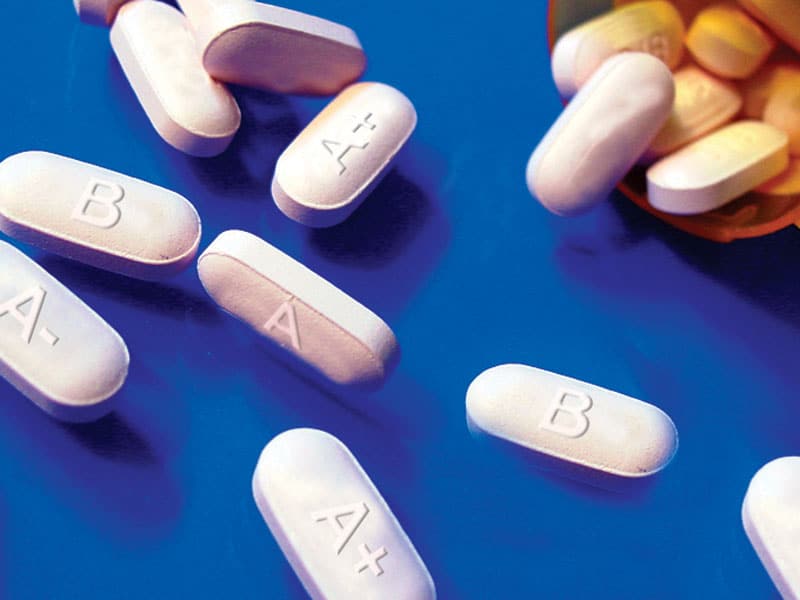
Any supplement that is used as a method for enhancing a person’s cognitive function is considered to be a smart drug. Also known as nootropics, these supplements are not used in the same method that illegal drugs are used. They are not a method of obtaining a ‘high’. Rather, they are intended to improve the ability to think, create, learn, recollect, concentrate and reason. This process takes the naturally occurring processes of the brain, and enhances these chemicals to increase cognitive function . How Do They Work? We all know how complex and confusing the functions of the brain can be. There are many different connections being made throughout the day and night. As these messages are being sent and received, there are a number of chemicals that are being released into the body. These messages and also the chemicals involved can control any number of bodily functions whether it be related to a person’s mood or their memory. When smart drugs are used how they are intended, they work alongside our normal brain chemicals to target things like your memory, energy and health. Are There Side Effects? As with any supplement or drug, smart drugs can affect people differently and sometimes cause certain side effects. Typically, these drugs are tolerated very well by people who take them, but if you experience any of the following unwanted side effects, you will want to stop taking the drug: Allergic reaction symptoms such as rashes, stuffy nose, sore throat. Weight Gain Gastrointestinal issues like diarrhea, vomiting and nausea. Where Can You Find Smart Drugs? As with any other supplement, you want to be careful of the type of product that you purchase and consume. You want to make sure that you are using a product that is manufactured by a reputable […]
Natural Foods That Fight Memory Loss

Everyone is concerned about memory loss. Memory loss is actually the first sign of Alzheimer’s disease. However, bad memory is a normal part of aging. During this life stage, changes occur in all parts of the body, including the brain. Some people realize that it takes longer to learn new things or don’t remember things as well as they did before. Causes of Memory Loss Some memory problems are related to health issues that can be treated: Vitamin B12 deficiency Chronic alcoholism Tumors Infections Blood clots in the brain Possible dementia Head injuries Cancer treatments (chemotherapy or radiation therapy) Stress Anxiety or depression These problems can make a person become more forgetful and can lead to misdiagnoses of mental illnesses. Another influencing factor is sudden life changes. Here are some of the most common symptoms of memory loss: Losing personal belongings frequently. Having a hard time finding the right words . Asking the same questions in a conversation, or telling the same story several times. Not remembering if you’ve done something, such as taking a drug. Becoming disoriented or getting lost in familiar places. Not knowing what year or day or the week it is. Having trouble remembering appointments or events. Having trouble following directions or making decisions . Short or Long-Term Memory Loss Short time memory loss consists of forgetting information that, after the bout of amnesia , you remember again. If you can’t remember a name but then you do an hour later or waking up not knowing what happened last night after one too many drinks are a couple of examples of short-term memory loss. On the other hand, permanent memory loss is information that you lose and aren’t able to recover. You can’t remember where you left your keys or forget that your mother visited […]
Top Brain Enhancement Supplements for Memory Booster (Updated 2018)
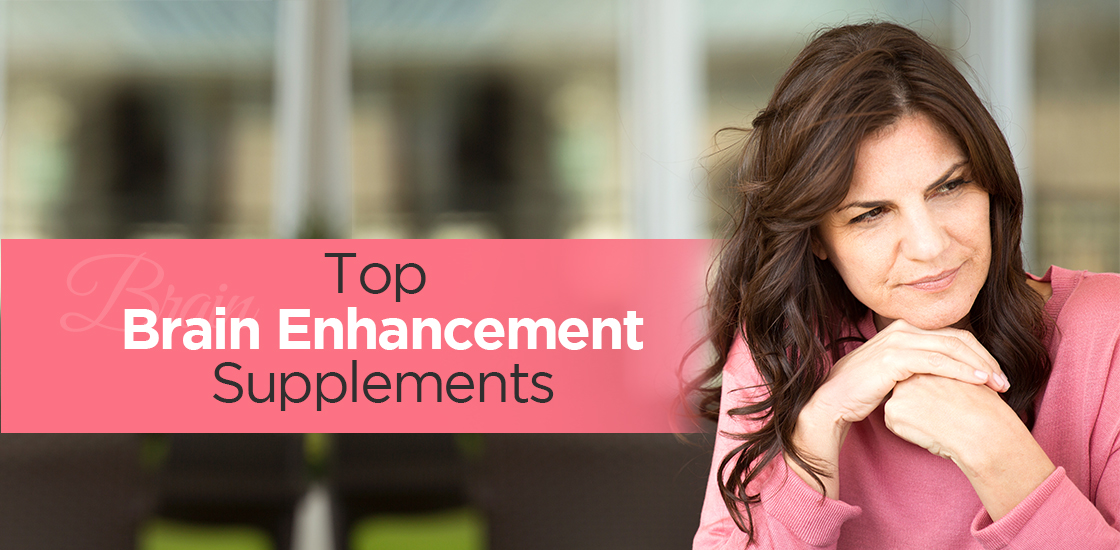
What is brain enhancement supplements? Brain Enhancement Supplements are medications that boost memory roles and brain cells. More so, these supplements come as cognitive enhancers (brain foods) with ingredients and vitamins to help memory. Naturally, the brain is smart but the overall goal for Brain Enhancement Supplements is for optimum mental performance. In several clinical surveys of memory improvements; results show that 25% of adults suffer from random memory disorders. How does brain enhancement supplements work? The best memory supplements can give patients some level of mental focus combining natural nootropics or herbal for better results. However, some cognitive enhancers work on the mind, concentration and give energy too. Smart drugs improve cognitive function (creativity, motivation, and memory) in consumers’ health. After swallowing brain enhancement supplements; the ingredients dissolve into the body and increase the secretion of acetylcholine (the neurotransmitter for learning and memory). Some nootropic supplements act as neural protectors and lessen cognitive decline in consumers. It is a bad practice to mix brain enhancers with other medication that treat blood pressure, or organ ailments. Consumers must speak with their doctors before they decide on the best focus supplements. Are brain enhancement supplements safe? brain enhancement supplements people buy daily. The safety of these supplements depends on the consumer’s medical condition and the source of ingredients. There is a countless number of brain-boosting supplements. But for overall mental performance choose wisely and contact your doctor. Different natural extracts exist that are helpful for cognitive functions and treatment of dementia. The best nootropic supplement contains active ingredients that are natural like ginkgo biloba extracts. A decline in the flow rate of blood in small vessels can make the brain cells failure or degrade. So, ginkgo biloba extracts have become a cure for people suffering from memory loss to restore […]
4 Supplements That Will Give You More Energy Than Coffee

Shutterstock Let’s be real, there are days when you *literally* can’t even. We know it’s a cliché, but you never know when fatigue is going to hit. Everyone feels sluggish during the middle of the day or when you’re at work, but most of us don’t know how to boost your energy levels when this happens. If you’re always tired and you feel it’s affecting your productivity at work—and life in general—then it may be worth it to talk to your doctor about taking supplements for low energy. When taken correctly and in the right dosage, natural supplements can improve your energy levels and the way your body functions. “Supplements provide you with the adequate requirement of the nutrients and minerals that your body needs to maintain optimal health,” Regina Fazzini, a New York-based nutritionist tells SheFinds. “This is especially the case for those who experience fatigue often and find that it hinders their daily performance at work, at the gym, or whenever they need it.” New to the supplement game? Here are 4 supplements that Fazzini and other health experts recommend to help give you a natural energy boost: Best Supplements For Low Energy: 1. Vitamin B12 “Your internal energy factories just don’t work as well without it,” Kathi Kemper, MD, director of the Center for Integrative Health and Wellness at Ohio State University, tells WebMD . Research shows that taking the supplement will help give you an extra energy boost. This water-soluble vitamin plays a big role in how your brain and nervous system function and will definitely help you get past that post-lunch slump. 2. Magnesium This mineral is vital to the body because of its effect on the function of blood pressure and the cardiovascular system. But, it’s been found that most people don’t have […]
6 Proven Supplements To Improve Your Mood And Mental Health (That Most People Ignore)

How can you know whether or not you’re doing enough for your mental health? First, did you know that around 40 percent of Americans take some supplement and undergo some “alternative” treatment? Harvard University researchers estimate that this percentage rises to about 50 percent among those diagnosed with a mental health condition. In other words, many of us need some boosts for our brain and mental health. Additionally, not only are more people taking supplements, but more medical professionals are attesting to the benefits of doing so. You can easily find evidence to suggest that some nutrients even boost brainpower! In short, if you’re not using supplementation for brain benefits, you may want to reconsider. Here are six supplements that improve your mood and mental health (Note: Information provided in this article is intended for entertainment purposes only. If you have questions about any potential treatment, please consult with your healthcare provider.) Gingko biloba Gingko biloba goes back some 270 million years. It is so old, in fact, that some people refer to it as a “living fossil.” Yes, gingko could very well have been sprouting when the dinosaurs were roaming about! (Wonder if any T-Rex munched on a gingko tree … hmm …) Brain Benefits: Researchers consider gingko an effective supplement for cognition. First, it boosts brain circulation (blood flow). Also, gingko contains great memory-boosting properties as well as fantastic brain protection benefits. In part, this is because of its high concentration of antioxidants. Europeans widely use gingko as a treatment for, or in the prevention of, dementia. What researchers say: A study published in the Journal of the American Medical Association concluded that gingko is “safe … and possibly effective in stabilizing and improving cognitive (functioning.)” Valerian root Valerian is an herbal supplement extracted from the root […]
Wonderful Water

After a night of sleep realistically you’ve gone one third of the day without taking in any fluids, add to that most people don’t drink enough water when they are awake. As much as 75% of the USA population may suffer from chronic dehydration. Drinking more water can be an easy fix for feeling tired, headaches, weakness, or constipation. Chugging back coffee is liquid but is not the same as wonderful water. Many ailments are believed to begin with unhealthy toxin ridden guts. Drinking water on an empty stomach especially first thing in the morning can help cleanse the stomach and support digestion. Water therapy has been used in Japanese traditional medicines as an essential element, 8-10 cups of water are recommended daily. Water can help aid weight loss, digestive issues, kidney health, skin health, brain function, and much more. Usha Paana Chikitsa practiced in India uses similar traditions. Human bodies are made of about 70% water, as is much of earth and just about everything on it, water is the natural life line, and everyone should be making sure the get enough of it. When a person first starts to drink at least a liter of water a day there can be a few unexpected effects such as a few extra pounds from retaining water, but that is short term, not to worry the body will adjust. Drinking water can help improve health without much effort at all. Water helps flush out sludge build up that accumulates in the colon where bacteria hide. Cleansing the colon can loosen and expel buildup so you can absorb nutrients faster and more efficiently. Water can replace high calorie beverages and help support metabolism, and increase caloric burn. Drinking one liter of water can help fight off hunger cues to stop those […]
Oral omega-3 supplementation linked to a reduced risk of eye disease in young adults

( Natural News ) Omega-3 fatty acids are highly regarded for their health benefits, especially when it comes to brain health. But it turns out omega-3s have a lot more to offer and can be highly beneficial to a set of organs that are often overlooked: the eyes. Researchers from Australia have found that healthy, young adults who supplement their diet with omega-3 fatty acids exhibit a reduced risk of eye disease as they age. Keeping your peepers healthy as you get on in years is a top concern, especially since the number of people who are affected by age-related deterioration is on the rise. Millions of people are affected by some form of age-related vision impairment. How many cases of eye disease could be prevented with better nutrition? Omega-3 supplements support eye health long-term The scientists at the University of Melbourne in Australia have found that omega-3 fatty acids can be a useful tool in the prevention of age-related vision impairments, including macular degeneration, glaucoma and dry eye disease. Past research has shown similar findings, concluding that an insufficient intake of the nutrient can increase the risk of developing such conditions later on in life. As sources explain, high intraocular pressure (IOP) is a “major modifiable risk factor” for the onset of glaucoma. While most conventional treatments for elevated IOP focus on topical solutions, the Melbourne team has investigated how an oral omega-3 supplement might fare at reducing IOP. To conduct their research, the team recruited 73 female and 32 male test subjects. Seventy-two were given an oral omega-3 supplement, and the rest of the 33 participants were given a placebo pill made of olive oil. The supplements were administered daily for three months. Sponsored solution from CWC Labs: This heavy metals test kit allows you to test […]
Scientists reveal that restricting eating to a 12-hour window prevents obesity

( Natural News ) Australian researchers report that restricting yourself to eating within a 12-hour window can help you avoid obesity. In an article on Health Medicine Network , the researchers show the results of a mice model where animals on a high-fat diet gained less weight when they were only allowed to eat during half the day. Mice are nocturnal animals. However, the study shows that it does not matter if they ate during their normal active period of night or during the day, when they are normally asleep. So long as they only have access to food for half the day, the mice would not gain as much weight despite their fatty diet. In comparison, rodents that eat the same amount of calories over an entire day are noticeably heavier. “Time-restricted feeding did not affect weight gain in the standard laboratory diet mice but decreased weight gain in the high-fat diet mice – irrespective of the time-restricted diet period,” remarks Amanda Page, a University of Adelaide professor who served as the study’s author. As applied to humans, that means no midnight snacks nor early breakfasts. Different studies have found that 8:00 a.m. to 8:00 p.m. is the best time for humans to eat. Eating outside that time period only fuels obesity. That is because eating a meal within those 12 hours moderates the signals that affect our appetite. (Related: The 7 ages of appetite: Understand these phases to eat better and prevent obesity .) The human body naturally tries to keep itself filled Professor Page and her researchers believe the mice with restricted feeding times have more sensitive vagus nerves . These nerves inform the brain about how filling a meal is. Support our mission and protect your health: Organic Seeds of Life combines Red Raspberry Seed […]
